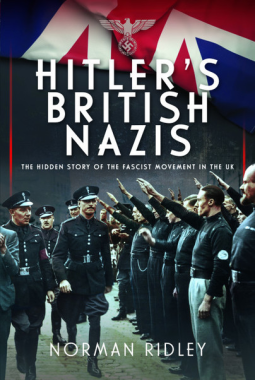
Hitler's British Nazis
The Hidden Story of the Fascist Movement in the UK
by Norman Ridley
This title was previously available on NetGalley and is now archived.
Send NetGalley books directly to your Kindle or Kindle app
1
To read on a Kindle or Kindle app, please add kindle@netgalley.com as an approved email address to receive files in your Amazon account. Click here for step-by-step instructions.
2
Also find your Kindle email address within your Amazon account, and enter it here.
Pub Date 30 Mar 2024 | Archive Date 7 Mar 2024
Pen & Sword | Frontline Books
Talking about this book? Use #HitlersBritishNazis #NetGalley. More hashtag tips!
Description
Following the end of the First World War, many countries experienced economic decline. Unemployment, high inflation, low wages and poor working conditions led to widespread unrest. This manifested itself in the rise of powerful militaristic leaders, first in Italy where fascism was born, and then in Germany and elsewhere. The policies of the likes of Mussolini and Hitler were hugely popular, and fascism was seen by many as a viable political alternative to democracy.
To some degree, these ideals also gained traction in the UK where some individuals in and among the elite of British society believed fascism was the way forward for the country. This is fully explored in Hitler’s British Nazis which traces the evolution of extreme right-wing opinion from the turn of the century right through to the end of the Second World War. In particular it looks at the way British fascism developed its own character due to Britain having been on the winning side during the First World War.
Early fascist movements of the 1920s are analysed including the fascist tendencies of the Suffragette Movement. The book then traces the way in which domestic politics and the dire economic situation of the early 1930s created a political vacuum that was filled by Oswald Mosley and his Blackshirt Movement.
Throughout the 1930s right-wing sympathisers looked to Hitler’s Germany rather than to Mussolini’s Italy for inspiration. Some members of aristocratic and political elites, many with virulent anti-Semitic views, saw in German fascism a template for Britain to build on but remained wilfully blind to the excesses of the Nazi regime that were getting worse by the day.
The book looks at the way in which Nazi Germany was depicted in the press and how powerful press barons, many of whom were pro-German and supported Chamberlain’s appeasement policies, were able to influence public opinion.
The role of the Mitford sisters, Unity in particular, is explored in detail as is the influence of the Cliveden Set under the leadership of the Astors and perhaps most interesting of all is the role played by King Edward VIII and Wallis Simpson as they flirted unashamedly with fascism and threatened to take Britain down a very different path to that which it took after the abdication.
Available Editions
| EDITION | Hardcover |
| ISBN | 9781399033343 |
| PRICE | |
Links
Available on NetGalley
Average rating from 10 members
Readers who liked this book also liked:
Catherine Merridale
General Fiction (Adult), Historical Fiction, Mystery & Thrillers
Linda Collister; National Trust Books
Cooking, Food & Wine, Crafts & Hobbies, Home & Garden


















